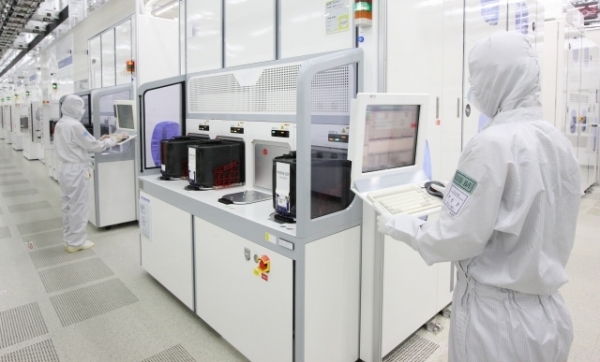The share price of Samsung Electronics on South Korea’s stock market has reached an unprecedented high yet again, surpassing 80,000 won ($73) during intraday trading Monday.
Hitting 80,100 won per share in the early morning trade, Samsung Electronics rose 1.2 percent to close at 78,700 won -- the highest closing price since a 50-to-1 stock split in 2018 -- bringing its market cap to a new high of 469.8 trillion won. This accounted for over 24 percent of all 906 constituents of the Kospi, the main board of the Korea Exchange.
The news comes as the nation’s largest tech company anticipates that the soaring global demand for its semiconductor foundry services will outstrip supply.
More global tech giants such as Apple and Microsoft are embarking on new semiconductor design projects, while conventional fabless semiconductor companies such as Qualcomm and Nvidia are strengthening ties with semiconductor foundry service providers like Samsung Electronics. This will translate into more orders of new custom-built products that are evolving and becoming more sophisticated with the advent of fifth-generation networks, cloud computing, artificial intelligence and other new technologies, from foundry firms’ perspective, analysts said.
The supply shortage for foundry services is also temporarily attributable to the US government sanctions on Chinese chipmaker SMIC, triggering more orders from counterparts in Taiwan and Korea, including Samsung Electronics, wrote Do Hyun-woo, an analyst with NH Investment & Securities.
Such momentum leads to a reassessment of Samsung Electronics’ valuation, riding on a virtuous cycle of improved earnings, improved cash flow and higher dividend payouts, another analyst said.
“Samsung Electronics has long been considered a cyclical stock,” wrote Lee Jae-man, an equity analyst at Hana Financial Investment. “But now that its stock price is hitting an all-time high as its profit rises, we interpret this as (investors’) reassessment of Samsung Electronics valuation.”
Being a market bellwether for Korea, Samsung Electronics has been a top pick among retail investors this year. According to the KRX, retail investors were estimated to have net bought Samsung Electronics shares worth nearly 9 trillion won this year through Thursday -- the greatest amount for any listed company in Korea. Retail investors on average are estimated to have bought Samsung Electronics shares for 53,000 won each.
Lee Seung-woo, a semiconductor stock analyst at Eugene Investment & Securities, projected Samsung Electronics’ operating profit would increase to 43 trillion won in 2021, up 18 percent on-year.
However, its businesses, ranging from semiconductor manufacturing to smartphones and other consumer electronics goods, are likely to be affected by a weak dollar and lockdowns in Europe in the fourth quarter. Lee estimated the quarterly operating profit at 9.4 trillion won, down 24 percent on-quarter.
The news came as the Kospi edged up 0.1 percent Monday, narrowly continuing the record run.
LG Electronics, which announced a spinoff of its electric vehicle components business into a new joint venture with Canada-based Magna International, surged 11.2 percent, and Hyndai Motor closed 1.3 percent higher. Meanwhile, chipmaker SK hynix tanked 2.1 percent, internet firm Naver edged down 0.4 percent and biotech firm Celltrion slid 4 percent.
“Korean equity investors’ inflow in stocks before the ex-dividend date on Tuesday outsized the outflow that stems from efforts to avoid taxes imposed on those holding at least 1 billion won worth of stocks,” Daishin Securities analyst Lee Kyoung-min wrote Monday.
Lee added that the Kospi 200 constituents’ combined yearly dividend for 2020 will jump 25 percent to 34 trillion won, with Samsung Electronics accounting for 44 percent if its special year-end cash dividends are included.
By Son Ji-hyoung (
consnow@heraldcorp.com)






![[Herald Interview] 'Trump will use tariffs as first line of defense for American manufacturing'](http://res.heraldm.com/phpwas/restmb_idxmake.php?idx=644&simg=/content/image/2024/11/26/20241126050017_0.jpg)
![[Exclusive] Hyundai Mobis eyes closer ties with BYD](http://res.heraldm.com/phpwas/restmb_idxmake.php?idx=644&simg=/content/image/2024/11/25/20241125050044_0.jpg)
